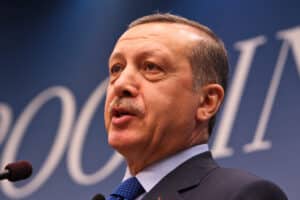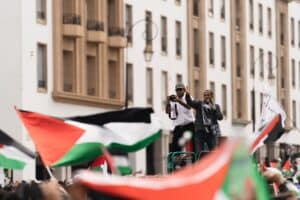Political factions Fatah and Hamas say they have agreed on the “mechanisms” for upcoming legislative and presidential elections, after historic reconciliation talks between the two movements. However, many key issues still need to be resolved in order to repair the Palestinian people’s and the international community’s trust in the democratic process.
Fifteen years of bitter divisions
Last week, Palestinian political factions completed their talks in Cairo. On the 8th of February, representatives from Fatah, Hamas and 12 other Palestinian political parties arrived in the Egyptian capital to prepare for the upcoming legislative and presidential elections, planned for May and July respectively. With the first elections in fifteen years coming up this year, it was time for the factions to mend fences after years of bitter divisions and failed reconciliation efforts.
Palestinian Authority president Mahmoud Abbas, a figure from the Fatah party, has refrained from holding new elections for many years. The last elections resulted in an unexpected landslide victory for the Islamist movement Hamas, which is blacklisted as a terrorist group by the EU and US. Abbas did not recognise the victory, which has resulted in a split Palestinian government. While Abbas continues to serve as president in an emergency government in the West Bank, Hamas has held power in the Gaza Strip since 2007. The Palestinian Legislative Council – which should serve as the aspiring state’s parliament – has not functioned since then. Numerous attempts at reconciliation between the two Palestinian governments have failed and the political situation in Palestine has long been at an impasse.
Historic progress made this year
In January of this year, Abbas announced elections would be held in the summer. Abbas’s timing is no coincidence. The newly elected Biden administration, which was installed in January and supports a two-state solution, has given an extra impulse. For years, Abbas has faced pressure from foreign allies to get Palestine’s political house in order. After four years of Donald Trump – during which Palestinians were side-lined by a peace plan that largely favoured Israel – the Palestinian-American relations have deteriorated. By agreeing to hold elections, Abbas is meeting the demands of the international community and signalling to Biden that Palestine wishes to repair its relations with Washington. Holding fair and legitimate elections would give a new Palestinian government a mandate for renewed US-led negotiations with Israel.
This week, further progress seems to have been made. In a joint statement on February 9th, all Palestinian political factions said they have agreed on the mechanisms and procedures for the upcoming elections. They further agreed on a timeline for the polls and, most importantly, they are “committed to respecting and accepting their results”. The deal establishes an “electoral court”, which is comprised of judges from the West Bank, Gaza and East Jerusalem, and will rule in any election-related legal disputes. In the statement, Hamas and Fatah – who exercise power in Gaza and the West Bank respectively – have also promised to allow members of the other party to campaign in their territory, committing to “public liberties and an atmosphere of political freedom”, as well as equal access to media.
The talks also resulted in what has been described as a major gesture of goodwill from the Egyptians. For the first time in years Egypt indefinitely opened its Rafah border crossing to the Gaza Strip. Egypt is the only country sharing a land border with Gaza aside from Israel. The Gaza Strip does not have an airport and has been under an Israeli land, sea and air blockade for over a decade, meaning the border crossing with Egypt is the only passage to the outside world that is not controlled by Israel. The Egyptian decision comes after intensive talks between Palestinian and Egyptian representatives. According to Al Jazeera, thousands of Palestinians have already been registering their names in the hopes of making their way into Egypt. “It’s their only lifeline to the outside world,” Al Jazeera’s Nida Ibrahim said.
Unresolved issues
In their statement, the factions also said that polling “must take place in Jerusalem, the West Bank and Gaza, without exception”. The disputed holy city is de facto ruled by Israel, which occupied East Jerusalem in 1967 and rejects Palestinian sovereignty in the city. Israel has yet to clarify its position on whether or not it will allow Palestinians living in East Jerusalem to vote. According to Palestinian estimates, there are 340,000 Palestinians in Jerusalem.
Another key question that remains unresolved is which security forces will oversee the polling stations. Both Fatah and Hamas reject each other’s law enforcement as illegitimate, and the declaration is vague on this issue, only saying that “the Palestinian police” will protect voters in the West Bank and Gaza.
There is also widespread scepticism that the elections will even happen, with many believing that it is only an attempt by Abbas to signal his democratic credentials to the Biden administration. President Abbas has vowed repeatedly to hold elections, but these promises were never fulfilled, mainly due to the rift between Fatah and Hamas. “I tell the Palestinians: trust what we have achieved,” urged Fatah delegation leader Rajoub at the end of this week’s talks in Cairo.
The elephant in the room remains Hamas’ legitimacy. The ruling Fatah party seeks to establish a democratic Palestinian state that is internationally recognised. Hamas’ participation in any Palestinian government is impossible until Hamas is granted legitimacy by the international community. For this, the movement must renounce violence and recognize the state of Israel. Hamas has not yet signalled any intention to do so. Steps have been made in the earlier Istanbul talks in September 2020, in which Hamas agreed to recognize the PLO as the sole representative of the Palestinians. But any legitimate cooperation remains impossible unless the two factions can resolve their stark difference in ideology.
It remains to be seen if these key problems will be resolved by May – if at all.
Sources: AL-MONITOR, TimesOfIsrael, AlJazeera1, AlJazeera2, WAFA, ForeignPolicy.
Image: WAFA



